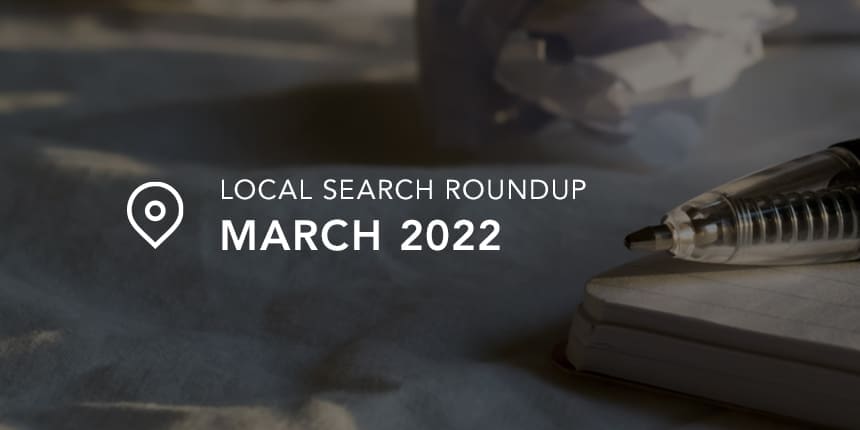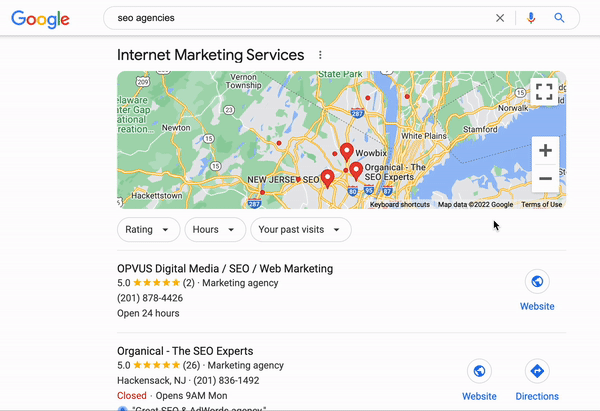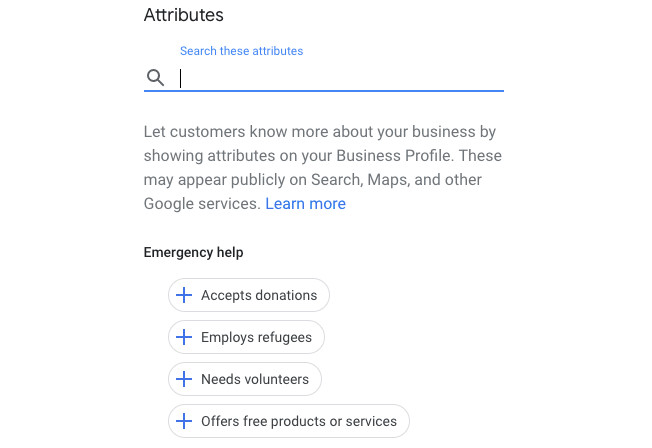
Maximize your local presence through strategic location management.

As Q1 2022 wraps up, the world of local search is once again evolving. Join us for a quick rundown of all the updates you need to know, including customer reviews being inadvertently nixed, UI changes in the local pack, double verification for business listings, and new “Emergency help” profile attributes.
As of March 7, Google has significantly escalated its automatic review filtering algorithm. While this is meant to combat spam reviews, there has been a drastic increase in the number of legitimate business reviews being prevented from going live on Google Business Profile (GBP) listings. Spam is a major problem for Google—and some industries, such as locksmithing, suffer its blight more than others—but this latest countermeasure seems to be hurting every sector.
Although every major review platform struggles to moderate high volumes of reviews, businesses and users alike recognize that Google has taken it a step too far. After all, aggregated ratings and reviews with keywords have become critical to driving digital performance. If your positive, legitimate reviews are being unintentionally filtered out, you may well lose ground on your competitors, especially if you run a small business with reviews in the double digits or less.
Google is aware of this filtering problem, but has so far only advised business owners to “remain patient”. In the meantime, businesses can only request authors of rejected reviews to resubmit with different wording—a work-around that’s impractical even on a small scale, never mind across multiple locations. Even then, there’s no guarantee that the edited review won’t be filtered a second time.
With no solution in sight, take solace in the fact that all businesses and industries seem to be equally impacted by this failed filtering update. If your business is losing reviews, at least your competitors are as well.
Google recently updated the map that accompanies three-pack results. It now displays zoom functions as well as a button that opens the local finder for additional results. But what’s most interesting is the freedom to interact with the map. By hovering over a business’s pin, searchers will see the business name, rating, and review count—and not just for the three top-ranking businesses in the local pack. Manipulation of the map, however, does not change the three top ranking businesses.

GIF: Search Engine Land
This update, while novel, doesn’t seem like it will affect the leads generated by the local pack too drastically. Because the top three results remain static, competing business will only appear if a user seeks them out in the new interactive map. If your business already ranks in the three pack, your position remains enviable. If your business doesn’t rank in the three pack, you may notice a minor increase in leads from users who discover your listing in the map.
Star ratings have also been given prominent display on the interactive map, appearing next to every business name. Users only need to double-click on a business to see the content of those reviews.
Claiming a GBP listing used to involve either phone verification, receiving a postcard, or the recently created (and not very common) video verification. While the process was simple for most small businesses, larger corporations and those with franchised locations often have difficulty claiming and managing all their GBP listings. This may become even more difficult in light of Google’s announcement that it may require more than one verification method.
It’s not yet known how Google determines when double verification is needed. It may prove to be deployed only in fraud-heavy industries, such as insurance. Until more data is gathered on how the multiple verification process works, businesses simply need to be aware that whoever they coordinate their profile claims with, they may need to work through an even longer process.
Subscribe to our monthly newsletter.
Google has expanded its free hotel listings and will now allow hotels to display their rates and availability directly through their Google Business Profile:
We will expand the report to include other insights, like free booking link impressions and booking value, in the coming weeks. Beginning next month, individual hotels that meet eligibility requirements can manually input their rates through their Google Business Profile to participate in free hotel booking links.
Google launched its free hotel listings in March of last year, and 12 months later it is still looking to compete with the likes of Tripadvisor and Orbitz. Minimal travel during the pandemic gave Google ample time to experiment in this space, and it seems to have captured some of the hospitality market while hotels were looking at every available avenue to attract new guests.
Paid results continue to appear at the top of Google’s rankings in search and on their travel planning page, but ongoing implementations of free features will encourage more hotels to use Google as a customer touch point. With Google not taking any booking fee for free placements, hotels may want to invest in this lead-generating tool. Paid placements, of course, will continue to reign supreme, but the potential bookings through free placements should be worth the effort of signing up.
Google has rolled out a series of business attributes under a new “Emergency help” category. These attributes cover aspects including donations, employing refugees, and asking for volunteers. Much like when Google introduced pandemic-related attributes (such as takeout and delivery statuses for restaurants), these new “Emergency help” attributes come in response to the situation in Ukraine.

Image: Search Engine Land
While attributes have always been a helpful way to connect customers to relevant businesses, this latest category isn’t about generating leads and driving sales. With businesses now able to quickly communicate their efforts to assist in the ongoing conflict, consumers can more easily do their part to reach people in need.
Google often lets users know when a business profile’s hours of operation have been updated, usually via the “Updated by this business” or “Confirmed by others” tags. The former is when a profile manager manually confirms hours of operation; the latter is when Google users corroborate the hours given. Both tags indicate when the change was made.
In March, Google rolled out a third verification method: “Confirmed by phone call”. These phone calls are actually automated through Google’s booking AI, Duplex, which uses natural-sounding speech to make appointments for users (for example, restaurant reservations). The “Confirmed by phone call” tag is applied after Duplex confirms hours of operation.
This move to improve the accuracy of opening hours will be especially useful during holidays and other times of year when operating status may be in question. One issue that arises, however, is that the person who answers Duplex’s call may not have full details on any planned changes to the business’s hours of operation. Businesses with large or distributed teams are advised to take a proactive approach to listings management to ensure accuracy. Want to know how? Let’s talk!
Maximize your local presence through strategic location management.
Maximize your local presence through strategic location management.
Subscribe to our monthly newsletter.